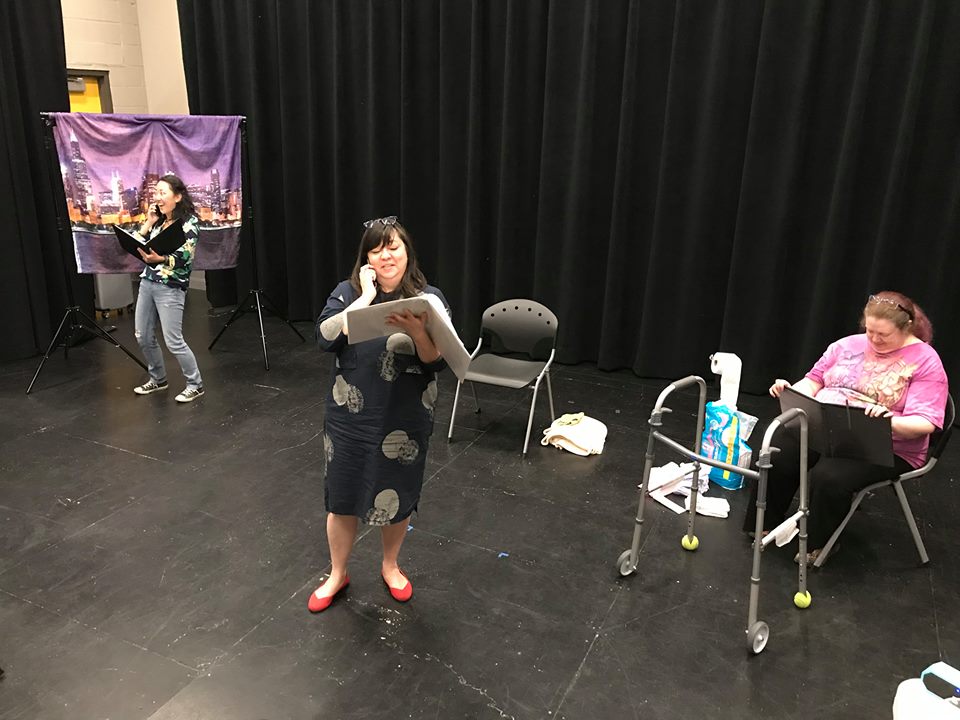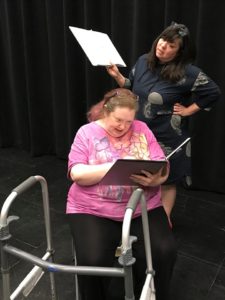In November of 2017, we met Betty (she/her/hers) and liz thomson (they/them/theirs) through the interview on November 20, 2017. They had just moved in together that fall and were adjusting to their new apartment in Greenwood, Indiana. Liz, who is an adoptee and identifies as bi/queer and gender non-conforming, interviewed Mom to get her thoughts on how the new situation was going. In September of 2018, Mom passed away and left liz with the logistics that follow a death, but also a deeply unexpected void in their life. Trying to cope in a healthy way, liz wrote Toilet Talks, a semi-fictional play about their elder care experience. Toilet Talks will be a free staged reading in IndyFringe’s 2019 DivaFest, on Thursday, April 18, 2019, at 8 p.m., at IndyFringe, 719 E. St. Clair St., Indpls.
blog written by liz thomson

Actors on stage during the rehearsal for Toilet Talks. Character Nguyen stands in front of backdrop with the Chicago skyline; Hannah is center stage talking on her smartphone; and Mom is stage right in the bathroom with a walker near her and various pads and diapers at her feet. (Photo by l. thomson)
Reflecting on Mom’s Death
It seems so long ago, but in some ways it feels like yesterday. Some days, I wake up and think that I’m just in a different apartment, and Mom is still alive, just elsewhere. Then, I remember that it’s just me in this temporary apartment. I can’t believe it’s been about six months since she died. I think the first three months were a blur. My primary objective was to go through her bedroom and the storage unit. Between many trips to Goodwill and taking some things to an auction house, I was able to get things to the point where I could move to a new place. For those two months that I was both sorting and packing, I asked my friends and family for help, both emotionally and physically.
I think one of the hardest things about her death was how fast she declined. She had been in bed for almost three weeks, which I knew she hated. She slept a lot of the day, but she still was eating and being a companion. I still had a purpose, and I could share my life with her – playing tennis, dating, and doing fun things in Indy. She always liked hearing what I was doing. Then, in late September it was harder for her to turn in bed, and she was very sleepy. She couldn’t really wake up for dinner. I called the hospice nurse on-call, and she said Mom was probably in the early stages of dying. I remember being in the kitchen when she told me, and I started to cry.
I hadn’t told her, “I loved her.” I hadn’t recorded her saying, “I love you, liz.” Her last words were not comforting. I thought we had more time. Then, the night before what would be her last night, I spent the night at the apartment with my partner consoling me. I regret not being in bed with her one last time. I’m glad she was “home” and not at a facility. I know she knew I loved her. I know she loved me. I know death scenes are not like the movies, but I still felt entirely unprepared for this situation.
Writing as an Outlet of Expression

Mom sits with her walker in front of her. Hannah stands behind her to her right. (Photo by l. thomson)
About a year ago, I had started writing a play about living with Mom. I had always done some kind of writing as a kid and into adulthood. This play was mostly set in the bathroom, where we spent a lot of our day together. I would wait in the bathroom with mom and to pass the time, we’d catch up on things going on. She might ask me about how things were. I might ask her things about the past I had been curious about, but never asked. Even though a year ago, I didn’t think she would die in September, I still felt this was a unique time for me to ask her things.
Later, I took a Foundations of Playwrighting class at the Indiana Writers Center. For the class, we worked on the first ten pages of a play. Although I already had a good number of pages, the class taught me the format, provided feedback, and – more importantly – held me accountable. After the class was done, I aimed to finish it and submit it to the IndyFringe’s DivaFest, which celebrates women playwrights. I submitted the play, and it got accepted as a staged reading, where actors read from scripts but interact with each other on stage and with props.
Toilet Talks: Conversations Between a Daughter and a Mother
The bathroom is an interesting and unique space. It’s such a vulnerable and intimate place. Typically, it’s a very gendered space so it’s a space where women go with other women. Or, men are with other men. At the apartment, I found myself in the bathroom with Mom about six times a day. I know she hated having me help, but she needed it. I tried to approach the bathroom duties with dignity and respect. We all need help sometime. She needed to be kept clean. She often lamented and felt shame about her body. “Don’t ever be overweight like me,” she’d say. This always made me feel sad.
As I reflect on the play, I hear a lot of frustration and anger come through the character of Hannah, the daughter. On one hand, Hannah does want to help and sees returning to Indiana only for a few weeks. On the other hand, she has built a life and her communities in Chicago. She left Indiana for a reason, and here she is back. For the Mom character, she tries to still be self-determined and have agency. She doesn’t want to be a burden and is also thinking about her own mortality. Some parts are funny. Some are sad. Some are challenging.
I just hope it will speak to others doing elder care and their parent. I’d offer: be kind to yourself. Be a daughter or son first, then an assistant. Ask and accept help. Treasure everyday – even the hard ones.
The opinions expressed in this article are those of the author and do not necessarily reflect those of the Diverse Elders Coalition.
